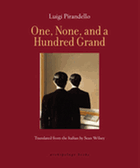
Boy, give a guy a little criticism, and all of a sudden, he's tumbling down a philosophical rabbit hole and questioning the nature of identity. Sound like Pirandello? Good guess. In One, None, and a Hundred Grand, a 1926 novel written by Luigi Pirandello and translated from the Italian by Sean Wilsey, metatheater's great farceur presents a rich, idle 28-year-old whose self-image doesn't jibe with the person others perceive. As Vitangelo Moscarda looks into a mirror and admires his nose, "if not beautiful, at least wholly inoffensive," his wife, Dida, catches his vanity off guard by telling him it leans to the right. His eyes, she adds, were "crowned by brows like circumflex accents," and his "ears were off-kilter, one more exorbitant than the other." The worst part? "I had to concede the accuracy of all these observations."
Thus begin the musings of a young man living off money earned by his late father, who co-founded a bank and made a bundle through usury. What passes for plot involves Vitangelo's dealings with two men "who've seen to [his] affairs since the death of [his] father" and his efforts to evict an artist who has lived rent-free in one of Vitangelo's properties. The novel is an excuse for Pirandello to expound upon the difficulty of truly knowing oneself and the irrevocability of one's actions, which, Vitangelo states, "envelop you like cords and tentacles; they hold you down." Like Vitangelo's nose, the story is slightly askew, which is what makes it so satisfying. This cerebral workout is a delight. --Michael Magras, freelance book reviewer

